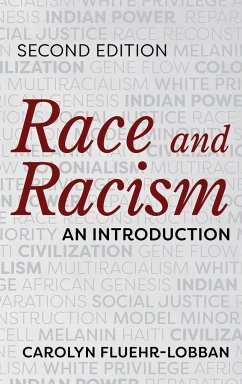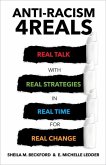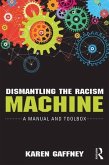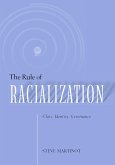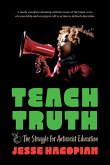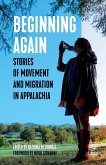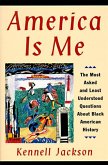- Broschiertes Buch
- Merkliste
- Auf die Merkliste
- Bewerten Bewerten
- Teilen
- Produkt teilen
- Produkterinnerung
- Produkterinnerung
Race and Racism examines race in society from an anthropological perspective.
Andere Kunden interessierten sich auch für
![Color-Blind Color-Blind]() Ellis CoseColor-Blind15,99 €
Ellis CoseColor-Blind15,99 €![Anti-Racism 4reals: Real Talk with Real Strategies in Real Time for Real Change Anti-Racism 4reals: Real Talk with Real Strategies in Real Time for Real Change]() Sheila M. BeckfordAnti-Racism 4reals: Real Talk with Real Strategies in Real Time for Real Change15,99 €
Sheila M. BeckfordAnti-Racism 4reals: Real Talk with Real Strategies in Real Time for Real Change15,99 €![Dismantling the Racism Machine Dismantling the Racism Machine]() Karen GaffneyDismantling the Racism Machine50,99 €
Karen GaffneyDismantling the Racism Machine50,99 €![Rule of Racialization: Class, Identity, Governance Rule of Racialization: Class, Identity, Governance]() Steve MartinotRule of Racialization: Class, Identity, Governance33,99 €
Steve MartinotRule of Racialization: Class, Identity, Governance33,99 €![Teach Truth Teach Truth]() Jesse HagopianTeach Truth20,99 €
Jesse HagopianTeach Truth20,99 €![Beginning Again Beginning Again]() Beginning Again16,99 €
Beginning Again16,99 €![America Is Me America Is Me]() Kennell JacksonAmerica Is Me18,99 €
Kennell JacksonAmerica Is Me18,99 €-
-
-
Race and Racism examines race in society from an anthropological perspective.
Hinweis: Dieser Artikel kann nur an eine deutsche Lieferadresse ausgeliefert werden.
Hinweis: Dieser Artikel kann nur an eine deutsche Lieferadresse ausgeliefert werden.
Produktdetails
- Produktdetails
- Verlag: Globe Pequot Publishing Group Inc/Bloomsbury
- 2nd edition
- Seitenzahl: 288
- Erscheinungstermin: 12. April 2018
- Englisch
- Abmessung: 226mm x 151mm x 12mm
- Gewicht: 345g
- ISBN-13: 9781442274594
- ISBN-10: 144227459X
- Artikelnr.: 50440545
- Herstellerkennzeichnung
- Libri GmbH
- Europaallee 1
- 36244 Bad Hersfeld
- gpsr@libri.de
- Verlag: Globe Pequot Publishing Group Inc/Bloomsbury
- 2nd edition
- Seitenzahl: 288
- Erscheinungstermin: 12. April 2018
- Englisch
- Abmessung: 226mm x 151mm x 12mm
- Gewicht: 345g
- ISBN-13: 9781442274594
- ISBN-10: 144227459X
- Artikelnr.: 50440545
- Herstellerkennzeichnung
- Libri GmbH
- Europaallee 1
- 36244 Bad Hersfeld
- gpsr@libri.de
By Carolyn Fluehr-Lobban
Preface About the Author 1. Anthropology, Race, and Racism What Is
Anthropology? What Is Race? What Is Racism? How Is Race Different from
Ethnicity, Religion, Language, and Other Differences? Why Is There So Much
Confusion? There Is No Science of Race, but Race Is Sociologically Real
Race and Ethnicity Distinguished Barack Obama and Donald Trump: Racial
Inclusion and Exclusion Breaking the Ice: Class Exercise to Initiate a
Dialogue on Race Class Exercises References 2. Race, Human Evolution, and
Natural Selection Human Evolution, the Story of African Genesis, "Out of
Africa" New Finds for Early Humans in Africa Asian Progenitors European
Early Humans Early Humans in the Americas Migration of Humans Out of Africa
Origins of Human Racial Difference: Modern Humans- Homo sapiens Race and
Science Models of the Origin of Races Human Variation- "Race"- as the Rich
History of Homo sapiens sapiens Mechanisms for Biological Change in Humans
Mutation Natural Selection Genetic Drift Gene Flow/ Migration Mating in
Homogenous Populations, Inbreeding Effects Random, Nonrandom Mating
Founders' Effect Racial Difference and Natural Selection "Race" Mixture and
Skin Color Albinos: The Only People with No Melanin, Found in All Races
Hair Form and Eye Color Body Type The Epicanthic Fold, "Asian" Eyes Blood
and Race Sickle Cell Anemia, Malaria, and Human Evolution Lactose
Intolerance and PTC Tasting Human History through Blood Types: DNA Mapping
of the Human Genome The Human Genome Project DNA: Helping African Americans
Trace Their Roots Curiosity about Racial Differences Study Questions
References 3. Making a Science of Racial Inequality Race and the Origins of
Anthropology One or Many Species of Humanity: Monogenism versus Polygenism
Race and Nineteenth- Century Evolution: Savagery, Barbarism, Civilization
Progressing from Dark to Light Races- from "Black" and "Red" Savages, to
"Yellow" and "Tan" Barbarians, to "White" Civilized Races The Three Great
Races: Caucasoid, Mongoloid, and Negroid The Negro/ African/ Ethiopian
Race: Constructing a "Science" of Black Inferiority The American
Anthropological Association's Recommendations for the 2000 and 2010 U.S.
Censuses Summary Questions for Discussion and Further Reflection References
4. Racism and Anti- Racism from the Nineteenth to the Twenty- First
Centuries Contrasting Ideas: The Inequality versus the Equality of Races
Aryan Supremacy The Social Darwinist and Eugenics Movements and Their
Critics Franz Boas and the Mainstreaming of Anti-Racist Anthropology
Lothrop Stoddard: Eugenicist, Immigration Opponent, Nazi Sympathizer
Contrasting Postwar Anthropologists: Anti-Racist Ashley Montagu (1905-
1999) and Racialist and Racist Carlton Coon (1942- 1962) Discussion
Questions References 5. Race, Intelligence, and Mental Testing So- Called
Race and So- Called Intelligence Anthropometry, Craniometry Amounting to
"Skeletomania" Skin Color and Intelligence Race and the Measurement of
Intelligence The Future of Race and Intelligence- Achievement Testing
Summary Discussion Questions References Notes 6. Whiteness, White Identity,
and the Future of White Privilege in America The Social Construction of
Whiteness Inventing White Privilege Confronting the History of White Racism
and Its Intergenerational Consequences Praising the History of Black- White
Unity The Important Role of White Women The Important Role of Working-
Class White Men Cultural Dimensions of Whiteness Popular Culture: What
White People Have Taken from Black People Hip- Hop Culture: How Young
Whites and Blacks Find Common Ground The Future of Whiteness in the Twenty-
First Century Whites Participating in and Advancing the Dialogue on Race
Discussion Questions References Notes 7. International Perspectives on Race
Relations Race and Racism in Selected European Nations Race in the New
World Hybrid Societies: The Caribbean and Latin America Selected Cases Race
in Africa: Selected Cases Egypt and the Two Sudans Race in the Middle East
Race in Major Cultures of Asia Treatment of Indigenous Peoples around the
World Global Efforts to Eradicate/ Ameliorate Racism Summary Discussion
Questions References 8. Racial Reconstruction and Transformation in America
Demographic and Social Transformation of the United States Race and the
Obama Presidency Black Lives [Still] Do Not Matter The Reconfiguration of
Race Race, Hollywood, and the Media, "Oscars so White" National Dialogue on
Race Emphasizing "Truth and Reconciliation" The Black- White Binary and the
Asian Model Minority Issues That Remain Unprocessed Challenging White
Privilege: What Whites Have to Contribute to the Dialogue on Race Best
Practices That Are Simple to Emulate: Rhode Island College Unity Players
Final Remarks Discussion Questions References Index
Anthropology? What Is Race? What Is Racism? How Is Race Different from
Ethnicity, Religion, Language, and Other Differences? Why Is There So Much
Confusion? There Is No Science of Race, but Race Is Sociologically Real
Race and Ethnicity Distinguished Barack Obama and Donald Trump: Racial
Inclusion and Exclusion Breaking the Ice: Class Exercise to Initiate a
Dialogue on Race Class Exercises References 2. Race, Human Evolution, and
Natural Selection Human Evolution, the Story of African Genesis, "Out of
Africa" New Finds for Early Humans in Africa Asian Progenitors European
Early Humans Early Humans in the Americas Migration of Humans Out of Africa
Origins of Human Racial Difference: Modern Humans- Homo sapiens Race and
Science Models of the Origin of Races Human Variation- "Race"- as the Rich
History of Homo sapiens sapiens Mechanisms for Biological Change in Humans
Mutation Natural Selection Genetic Drift Gene Flow/ Migration Mating in
Homogenous Populations, Inbreeding Effects Random, Nonrandom Mating
Founders' Effect Racial Difference and Natural Selection "Race" Mixture and
Skin Color Albinos: The Only People with No Melanin, Found in All Races
Hair Form and Eye Color Body Type The Epicanthic Fold, "Asian" Eyes Blood
and Race Sickle Cell Anemia, Malaria, and Human Evolution Lactose
Intolerance and PTC Tasting Human History through Blood Types: DNA Mapping
of the Human Genome The Human Genome Project DNA: Helping African Americans
Trace Their Roots Curiosity about Racial Differences Study Questions
References 3. Making a Science of Racial Inequality Race and the Origins of
Anthropology One or Many Species of Humanity: Monogenism versus Polygenism
Race and Nineteenth- Century Evolution: Savagery, Barbarism, Civilization
Progressing from Dark to Light Races- from "Black" and "Red" Savages, to
"Yellow" and "Tan" Barbarians, to "White" Civilized Races The Three Great
Races: Caucasoid, Mongoloid, and Negroid The Negro/ African/ Ethiopian
Race: Constructing a "Science" of Black Inferiority The American
Anthropological Association's Recommendations for the 2000 and 2010 U.S.
Censuses Summary Questions for Discussion and Further Reflection References
4. Racism and Anti- Racism from the Nineteenth to the Twenty- First
Centuries Contrasting Ideas: The Inequality versus the Equality of Races
Aryan Supremacy The Social Darwinist and Eugenics Movements and Their
Critics Franz Boas and the Mainstreaming of Anti-Racist Anthropology
Lothrop Stoddard: Eugenicist, Immigration Opponent, Nazi Sympathizer
Contrasting Postwar Anthropologists: Anti-Racist Ashley Montagu (1905-
1999) and Racialist and Racist Carlton Coon (1942- 1962) Discussion
Questions References 5. Race, Intelligence, and Mental Testing So- Called
Race and So- Called Intelligence Anthropometry, Craniometry Amounting to
"Skeletomania" Skin Color and Intelligence Race and the Measurement of
Intelligence The Future of Race and Intelligence- Achievement Testing
Summary Discussion Questions References Notes 6. Whiteness, White Identity,
and the Future of White Privilege in America The Social Construction of
Whiteness Inventing White Privilege Confronting the History of White Racism
and Its Intergenerational Consequences Praising the History of Black- White
Unity The Important Role of White Women The Important Role of Working-
Class White Men Cultural Dimensions of Whiteness Popular Culture: What
White People Have Taken from Black People Hip- Hop Culture: How Young
Whites and Blacks Find Common Ground The Future of Whiteness in the Twenty-
First Century Whites Participating in and Advancing the Dialogue on Race
Discussion Questions References Notes 7. International Perspectives on Race
Relations Race and Racism in Selected European Nations Race in the New
World Hybrid Societies: The Caribbean and Latin America Selected Cases Race
in Africa: Selected Cases Egypt and the Two Sudans Race in the Middle East
Race in Major Cultures of Asia Treatment of Indigenous Peoples around the
World Global Efforts to Eradicate/ Ameliorate Racism Summary Discussion
Questions References 8. Racial Reconstruction and Transformation in America
Demographic and Social Transformation of the United States Race and the
Obama Presidency Black Lives [Still] Do Not Matter The Reconfiguration of
Race Race, Hollywood, and the Media, "Oscars so White" National Dialogue on
Race Emphasizing "Truth and Reconciliation" The Black- White Binary and the
Asian Model Minority Issues That Remain Unprocessed Challenging White
Privilege: What Whites Have to Contribute to the Dialogue on Race Best
Practices That Are Simple to Emulate: Rhode Island College Unity Players
Final Remarks Discussion Questions References Index
Preface About the Author 1. Anthropology, Race, and Racism What Is
Anthropology? What Is Race? What Is Racism? How Is Race Different from
Ethnicity, Religion, Language, and Other Differences? Why Is There So Much
Confusion? There Is No Science of Race, but Race Is Sociologically Real
Race and Ethnicity Distinguished Barack Obama and Donald Trump: Racial
Inclusion and Exclusion Breaking the Ice: Class Exercise to Initiate a
Dialogue on Race Class Exercises References 2. Race, Human Evolution, and
Natural Selection Human Evolution, the Story of African Genesis, "Out of
Africa" New Finds for Early Humans in Africa Asian Progenitors European
Early Humans Early Humans in the Americas Migration of Humans Out of Africa
Origins of Human Racial Difference: Modern Humans- Homo sapiens Race and
Science Models of the Origin of Races Human Variation- "Race"- as the Rich
History of Homo sapiens sapiens Mechanisms for Biological Change in Humans
Mutation Natural Selection Genetic Drift Gene Flow/ Migration Mating in
Homogenous Populations, Inbreeding Effects Random, Nonrandom Mating
Founders' Effect Racial Difference and Natural Selection "Race" Mixture and
Skin Color Albinos: The Only People with No Melanin, Found in All Races
Hair Form and Eye Color Body Type The Epicanthic Fold, "Asian" Eyes Blood
and Race Sickle Cell Anemia, Malaria, and Human Evolution Lactose
Intolerance and PTC Tasting Human History through Blood Types: DNA Mapping
of the Human Genome The Human Genome Project DNA: Helping African Americans
Trace Their Roots Curiosity about Racial Differences Study Questions
References 3. Making a Science of Racial Inequality Race and the Origins of
Anthropology One or Many Species of Humanity: Monogenism versus Polygenism
Race and Nineteenth- Century Evolution: Savagery, Barbarism, Civilization
Progressing from Dark to Light Races- from "Black" and "Red" Savages, to
"Yellow" and "Tan" Barbarians, to "White" Civilized Races The Three Great
Races: Caucasoid, Mongoloid, and Negroid The Negro/ African/ Ethiopian
Race: Constructing a "Science" of Black Inferiority The American
Anthropological Association's Recommendations for the 2000 and 2010 U.S.
Censuses Summary Questions for Discussion and Further Reflection References
4. Racism and Anti- Racism from the Nineteenth to the Twenty- First
Centuries Contrasting Ideas: The Inequality versus the Equality of Races
Aryan Supremacy The Social Darwinist and Eugenics Movements and Their
Critics Franz Boas and the Mainstreaming of Anti-Racist Anthropology
Lothrop Stoddard: Eugenicist, Immigration Opponent, Nazi Sympathizer
Contrasting Postwar Anthropologists: Anti-Racist Ashley Montagu (1905-
1999) and Racialist and Racist Carlton Coon (1942- 1962) Discussion
Questions References 5. Race, Intelligence, and Mental Testing So- Called
Race and So- Called Intelligence Anthropometry, Craniometry Amounting to
"Skeletomania" Skin Color and Intelligence Race and the Measurement of
Intelligence The Future of Race and Intelligence- Achievement Testing
Summary Discussion Questions References Notes 6. Whiteness, White Identity,
and the Future of White Privilege in America The Social Construction of
Whiteness Inventing White Privilege Confronting the History of White Racism
and Its Intergenerational Consequences Praising the History of Black- White
Unity The Important Role of White Women The Important Role of Working-
Class White Men Cultural Dimensions of Whiteness Popular Culture: What
White People Have Taken from Black People Hip- Hop Culture: How Young
Whites and Blacks Find Common Ground The Future of Whiteness in the Twenty-
First Century Whites Participating in and Advancing the Dialogue on Race
Discussion Questions References Notes 7. International Perspectives on Race
Relations Race and Racism in Selected European Nations Race in the New
World Hybrid Societies: The Caribbean and Latin America Selected Cases Race
in Africa: Selected Cases Egypt and the Two Sudans Race in the Middle East
Race in Major Cultures of Asia Treatment of Indigenous Peoples around the
World Global Efforts to Eradicate/ Ameliorate Racism Summary Discussion
Questions References 8. Racial Reconstruction and Transformation in America
Demographic and Social Transformation of the United States Race and the
Obama Presidency Black Lives [Still] Do Not Matter The Reconfiguration of
Race Race, Hollywood, and the Media, "Oscars so White" National Dialogue on
Race Emphasizing "Truth and Reconciliation" The Black- White Binary and the
Asian Model Minority Issues That Remain Unprocessed Challenging White
Privilege: What Whites Have to Contribute to the Dialogue on Race Best
Practices That Are Simple to Emulate: Rhode Island College Unity Players
Final Remarks Discussion Questions References Index
Anthropology? What Is Race? What Is Racism? How Is Race Different from
Ethnicity, Religion, Language, and Other Differences? Why Is There So Much
Confusion? There Is No Science of Race, but Race Is Sociologically Real
Race and Ethnicity Distinguished Barack Obama and Donald Trump: Racial
Inclusion and Exclusion Breaking the Ice: Class Exercise to Initiate a
Dialogue on Race Class Exercises References 2. Race, Human Evolution, and
Natural Selection Human Evolution, the Story of African Genesis, "Out of
Africa" New Finds for Early Humans in Africa Asian Progenitors European
Early Humans Early Humans in the Americas Migration of Humans Out of Africa
Origins of Human Racial Difference: Modern Humans- Homo sapiens Race and
Science Models of the Origin of Races Human Variation- "Race"- as the Rich
History of Homo sapiens sapiens Mechanisms for Biological Change in Humans
Mutation Natural Selection Genetic Drift Gene Flow/ Migration Mating in
Homogenous Populations, Inbreeding Effects Random, Nonrandom Mating
Founders' Effect Racial Difference and Natural Selection "Race" Mixture and
Skin Color Albinos: The Only People with No Melanin, Found in All Races
Hair Form and Eye Color Body Type The Epicanthic Fold, "Asian" Eyes Blood
and Race Sickle Cell Anemia, Malaria, and Human Evolution Lactose
Intolerance and PTC Tasting Human History through Blood Types: DNA Mapping
of the Human Genome The Human Genome Project DNA: Helping African Americans
Trace Their Roots Curiosity about Racial Differences Study Questions
References 3. Making a Science of Racial Inequality Race and the Origins of
Anthropology One or Many Species of Humanity: Monogenism versus Polygenism
Race and Nineteenth- Century Evolution: Savagery, Barbarism, Civilization
Progressing from Dark to Light Races- from "Black" and "Red" Savages, to
"Yellow" and "Tan" Barbarians, to "White" Civilized Races The Three Great
Races: Caucasoid, Mongoloid, and Negroid The Negro/ African/ Ethiopian
Race: Constructing a "Science" of Black Inferiority The American
Anthropological Association's Recommendations for the 2000 and 2010 U.S.
Censuses Summary Questions for Discussion and Further Reflection References
4. Racism and Anti- Racism from the Nineteenth to the Twenty- First
Centuries Contrasting Ideas: The Inequality versus the Equality of Races
Aryan Supremacy The Social Darwinist and Eugenics Movements and Their
Critics Franz Boas and the Mainstreaming of Anti-Racist Anthropology
Lothrop Stoddard: Eugenicist, Immigration Opponent, Nazi Sympathizer
Contrasting Postwar Anthropologists: Anti-Racist Ashley Montagu (1905-
1999) and Racialist and Racist Carlton Coon (1942- 1962) Discussion
Questions References 5. Race, Intelligence, and Mental Testing So- Called
Race and So- Called Intelligence Anthropometry, Craniometry Amounting to
"Skeletomania" Skin Color and Intelligence Race and the Measurement of
Intelligence The Future of Race and Intelligence- Achievement Testing
Summary Discussion Questions References Notes 6. Whiteness, White Identity,
and the Future of White Privilege in America The Social Construction of
Whiteness Inventing White Privilege Confronting the History of White Racism
and Its Intergenerational Consequences Praising the History of Black- White
Unity The Important Role of White Women The Important Role of Working-
Class White Men Cultural Dimensions of Whiteness Popular Culture: What
White People Have Taken from Black People Hip- Hop Culture: How Young
Whites and Blacks Find Common Ground The Future of Whiteness in the Twenty-
First Century Whites Participating in and Advancing the Dialogue on Race
Discussion Questions References Notes 7. International Perspectives on Race
Relations Race and Racism in Selected European Nations Race in the New
World Hybrid Societies: The Caribbean and Latin America Selected Cases Race
in Africa: Selected Cases Egypt and the Two Sudans Race in the Middle East
Race in Major Cultures of Asia Treatment of Indigenous Peoples around the
World Global Efforts to Eradicate/ Ameliorate Racism Summary Discussion
Questions References 8. Racial Reconstruction and Transformation in America
Demographic and Social Transformation of the United States Race and the
Obama Presidency Black Lives [Still] Do Not Matter The Reconfiguration of
Race Race, Hollywood, and the Media, "Oscars so White" National Dialogue on
Race Emphasizing "Truth and Reconciliation" The Black- White Binary and the
Asian Model Minority Issues That Remain Unprocessed Challenging White
Privilege: What Whites Have to Contribute to the Dialogue on Race Best
Practices That Are Simple to Emulate: Rhode Island College Unity Players
Final Remarks Discussion Questions References Index

